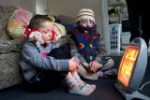UK Poverty and the 2017 General Election

Over two years ago the Commission held a one day conference about foodbanks. At that time nearly a million sets of emergency food supplies were being given out by the foodbanks organised by the Trussell Trust. Since then the situation has become worse. More people are using foodbanks today than 2 years ago. The rate of increase in usage has slowed – as the infographic below shows – but in the last 6 years there has been an almost tenfold increase in the numbers obtaining emergency food supplies from trust foodbanks.

Of course, this is not the whole picture. At the time of our conference we also undertook a survey within the Diocese to try and establish how many people were involved with providing food to people in local situations where they did not have enough. From this we estimated that about 1200 to 1500 people were either giving food items regularly or helping out with the provision of food in other ways. Many of these activities were the initiatives of individual parishes or Churches Together groups in a particular area. None of these activities show up in the Trussell Trust statistics. Consequently, the real situation is worse than the horrifying figures given above.
Remember, this is happening in our country – in one of the top ten richest countries in the World.
This is only one of many issues where Catholics need to review their candidate options in the light of Catholic Social Teaching. Elections are not something where we can just put our faith to one side. How we relate to one another is at the heart of Catholic Social Teaching and must be at the heart of how we vote for our country to be governed.
This is easy to say but much more difficult to do: we live in a messy world where situations are much more complicated than a twenty second soundbite might suggest. Perhaps a starting point is to try and listen to the voice of poor people – both in this country and across the world.
In March 2016 we were instrumental in bringing the Las Casas Institute of Oxford University to Leeds Trinity University spend a day exploring what Pope Francis meant by wanting a ‘Poor church, for the poor’. The question is still relevant today – perhaps even more so in the light of the General Election campaigning that is already well underway.
*****************************************
